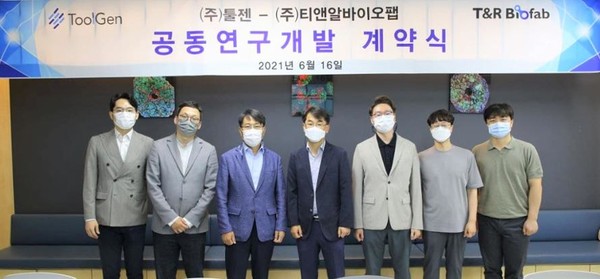ToolGen, a company specializing in gene editing, said it has signed a joint research deal with T&R Biofab, a three-dimensional (3D) bioprinting company, to develop induced pluripotent stem cells (iPSC) to overcome immune rejection.

Under the accord, the two companies will rectify genes related to immune rejection and develop iPSC to regenerative medicine for a wide range of diseases and verify the efficacy. Most of the developed cell therapies use autologous cells due to immune rejection when transplanted, but allogeneic cell transplantation could be used if related genes could be edited.
The two companies will focus on verifying gene editing to overcome immune rejection by combining target genes differentiated from the ones for overcoming immune rejection in existing research and development.
“Grafting gene-editing technology to stem cells and to overcome immune rejection are key steps for its use in regenerative medicine,” said Lee Jae-young, director of Research and Development of Therapeutics at ToolGen said. “iPSC is an ideal platform for developing genetically edited cell therapies as it can be differentiated into various cells.”
iPSC can be directly produced from adult cells and can be used for developing cell therapies, artificial organs, and organoids through differentiation. T&R Biofab established a commercial iPSC bank and secured the copyright for cardiac muscle cells differentiated from iPSC through a license agreement with iPS Academia Japan last year.
Gene editing is a technology that modifies genetic information in cells using gene scissors. ToolGen has been conducting studies and businesses developing therapy and breeding animals and plants based on the original patent for Clustered Regularly Interspaced Short Palindromic Repeats (CRISPR) with CRISPR-associated protein 9 (Cas9).
“The introduction of gene technology to the development of cell therapy using iPSC is the latest biotechnology, and we expect to develop novel cell therapies through synergistic effect by teaming up with ToolGEn,” T&R Biofab CEO Yoon Won-soo said. “The recent agreement would provide new therapeutic alternatives for patients with various intractable immune diseases.”
ToolGen CEO Kim Young-ho also said, “We plan to verify our gene-editing technology and strategy to overcome immune rejection through the joint research, and we also expect the technology to be applied to T&R Biofab’s 3D printing and develop as a significant treatment in regenerative medicines.”

